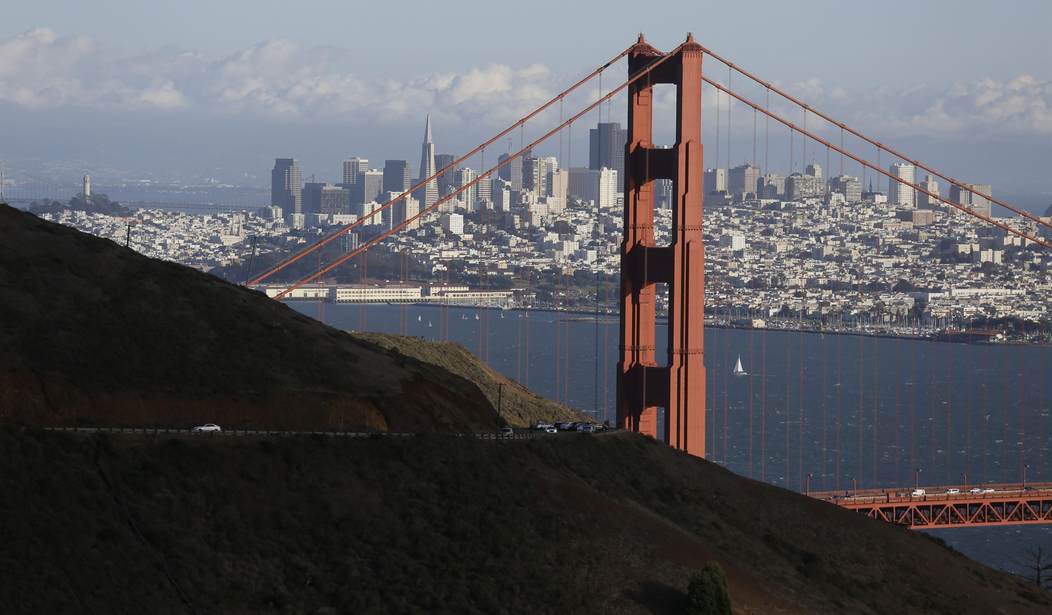Certain phenomena in economic matters are as certain as the sunrise, and one of those is supply and demand. When supply exceeds demand, prices drop. When demand exceeds supply, prices rise. And when the supply is depressed by government, by excessive taxation, by excessive regulation, housing prices go up. That's what has happened in many of our Democrat-run major cities right now. In places like San Francisco, housing is so egregiously expensive that many of the people who work in the city can't live there; they drive many miles to get to work.
Another phenomenon that is as certain as the sunrise is this: When the government depresses the supply of any item or commodity, by excessive taxation, by excessive regulation, black markets appear. That's what is happening in some of our major cities - black markets in housing.
It's happening right now in San Francisco.
The owners of three single-room occupancy (SRO) hotels in San Francisco’s Chinatown recently settled a lawsuit with the city, agreeing to pay a hefty fine of more than $800,000. Among their alleged crimes was that they “illegally converted, combined or added unauthorized housing units” to their properties.
The allegations expose something that should be humiliating for San Francisco: the development of a black market for housing.
The lawsuit was not San Francisco’s only effort to combat the underground housing market. In recent years, to name a few examples, the city sued a man for cramming 15 tenants into a three-bedroom home and fined a developer $1.2 million for constructing an apartment complex with triple the residential units that city planners had approved.
Even Jack “Ziz” LaSota—leader of the Zizians, a cult-like group of transgender vegan programmers linked to several murders—recruited followers as part of a shady rental scheme. LaSota had purchased a used tugboat for $600 and sailed it to San Francisco with plans to evade housing regulations by anchoring it offshore and renting its rooms to like-minded tenants.
To anyone who understands economics, especially supply and demand and price theory, this was easily predictable. And San Francisco, a city whose decline, we should remember, was accelerated under the incompetent leadership of then-Mayor Gavin Newsom, has been passing every single law, rule, and regulation they possibly can to restrict housing. It's hard to see this as anything but deliberate.
Black market housing is a direct result of state and city policies.
Black market housing works similarly, with desperate residents choosing dangerous homes because legal rents are unaffordable. The city evicted a man from his $400 “apartment” after discovering it was just a tiny wooden box in somebody else’s living room, violating the fire code. The fire code provides sensible safety precautions that were put in place after the great conflagration of 1906, and it did not impede rebuilding efforts. But when an oppressive regulatory environment creates black markets, all regulations go out the window—even the most sensible ones.
San Francisco’s black market for housing is the direct outcome of the city’s abandonment of private property rights. San Franciscans can still own property, to be clear, but the rights traditionally attached to it are wholly subject to the whims of the populace. In addition to oppressive zoning regulations, San Francisco subjects every building permit to discretionary review. Discretionary review hearings invite every city resident to weigh in on what a person should be allowed to do with his or her property.
Ay, that's the rub. Property rights are nonexistent in San Francisco.
Read More: The Downfall of America's Cities: Our Major Cities Are All Democrat Bastions
The Downfall of America's Cities: San Francisco, a Billion-Dollar Homeless Encampment
It's unlikely in the extreme that San Francisco will be persuaded to change these policies, and that's a shame, because a restoration of private property rights and relaxation of zoning would make a huge difference. Tokyo, a city with which I am very familiar, houses far more people far more affordably in much less space, and they do it by going vertical; high-rise apartment buildings are common in that city. Young people in Japan move to Tokyo not only for the bright lights and fast times, but for jobs, and because they can afford to live in Tokyo.
San Francisco could do this.
Another problem, and this is a big one, is that much of this black market housing is unsafe. Many of these "rentals" are only a small step above a cardboard box in an alley. They violate fire codes, which are actually a sensible bit of regulation; San Francisco's fire codes were first put in place after the 1906 earthquake and the resulting fire that destroyed much of the city. The city could fix this with deregulation, with relaxing zoning, with a return to free markets for housing. But they won't. San Francisco has proved, once again, that the city's leadership is, by all evidence, incapable of doing the right thing, even when the obvious path is laid out before them.
Leftist government, as is so often the case, is the problem, not the solution. As long as San Francisco and, indeed, all of California remain a single-party state, allowing the elite left coast progressives to run the city and the state unchecked, the housing situation is only going to get worse, and the growth of urban black markets offering cheap, improvised housing will only increase.














